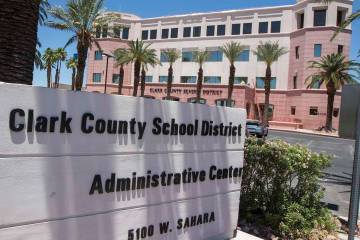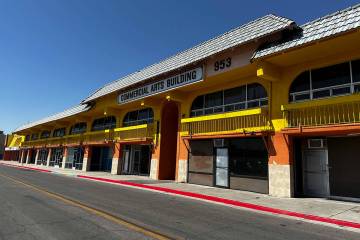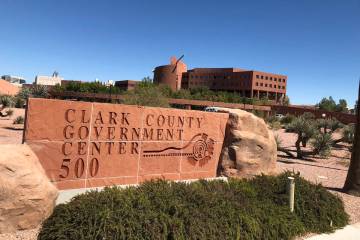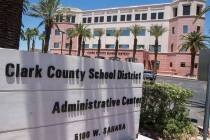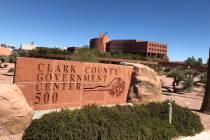Makeup of Clark County board raises eyebrows
Time was tight for agencies seeking a slice of Clark County’s federal grant monies.
A mixture of 22 local nonprofits, courts and government departments appearing before the county’s Local Law Enforcement Advisory Committee last week each had three minutes to make their pitch for a portion of $975,000.
But District Attorney Steve Wolfson tripled his office’s request time by opining from the dais on why his office should receive funding for two special prosecutors in the gang unit.
“You are all doing great work,” he told applicants. “But as we all know, there’s a limited number of monies to go around. … With that in mind, I do feel an obligation as the Clark County district attorney to advocate for my agency.”
The committee meets annually to make funding recommendations to the county commission. And like last year, the district attorney’s office received the largest recommendation for funding: $240,000.
Wolfson’s positions on the committee and as a representative of an entity it recommends money for is no exception. At least eight of the committee’s 10 members are tied to grant applicants.
Committee members disclosed their affiliations at the start of the meeting, but none recused themselves from the vote to recommend money for their organizations.
Whether that’s a problem has split both board members and ethics experts alike.
County Commissioner Lawrence Weekly, an LLEAC member for more than a decade, told the Las Vegas Review-Journal it might be best for LLEAC to consist of locals with no vested interest in any applicants. He also expressed his concern to fellow commissioners during their Tuesday meeting.
“It’s a concern for us that it has appearances of conflicts of interest,” he said. “What happens is you you get over $2 million in requests for these grant funds … . It’s a pretty pleasant meeting but it gets really contentious because everybody is jockeying for their own entity’s best interests.”
Terri Janison, an LLEAC committee member and a vice president for United Way of Southern Nevada, said she is concerned that so many committee members have ties to grant applicants.
“They have more of an opportunity to be able to speak on behalf of their application than all those other applicants out there,” she said. “They were also able to make recommendations for who gets the funding.”
But committee Chairwoman Chris Giunchigliani, also a county commissioner, said the committee’s procedures are legally sound. Its membership is outlined in county ordinance.
“They didn’t need to, in my opinion, recuse themselves from voting,” she said. “None of that funding benefits them as an individual.”
Wolfson declined to comment.
Ethics experts weigh in
“Generally, committees that are made up in this fashion are problematic because they do raise conflict-of-interest questions,” said Hana Callaghan, director of government ethics at Santa Clara University’s Markkula Center for Applied Ethics.
“It calls into question the fairness of the process and whether (committee members) are acting in self-interest or the public’s interest,” she said. “It seems that best practices would recommend an independent committee rather than one where the stakeholders are involved. That’s not to say you can’t provide input, but you shouldn’t be a decision maker.”
Jon Michaels, a UCLA law professor, said there is a “difference between personal gain and institutional gain. Saying, ‘I should get a tax refund’ is different than saying, ‘My organization should get a grant.’”
“The big issue with if there’s conflict of interest is how much control these folks have (over allocation of funding),” he said. “And if they’re just making recommendations and those are just advisory, the concerns are much less considerable.”
Contact Michael Scott Davidson at sdavidson@reviewjournal.com or 702-477-3861. Follow @davidsonlvrj on Twitter.




